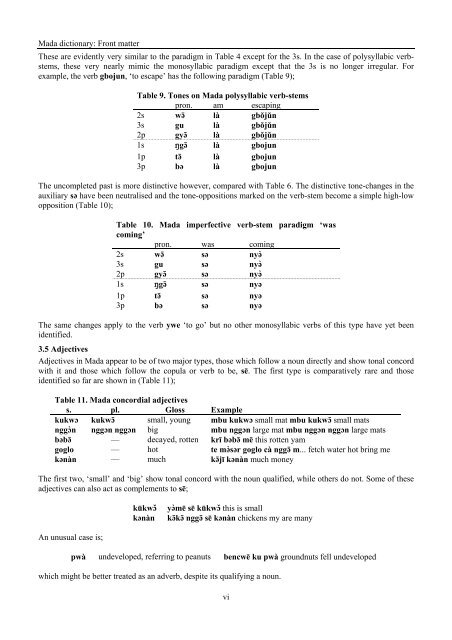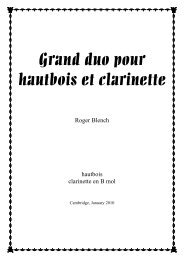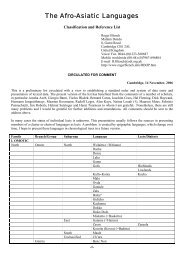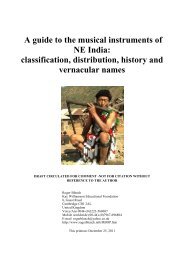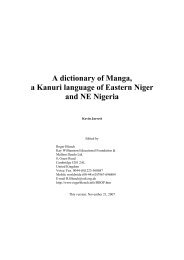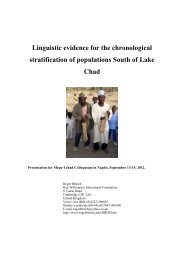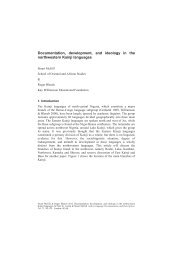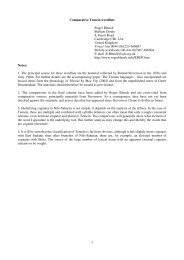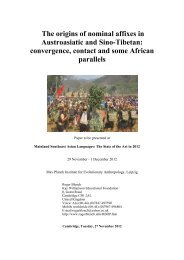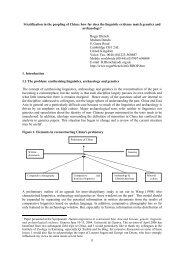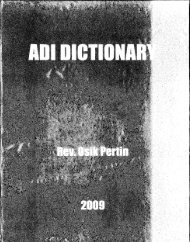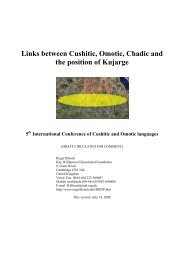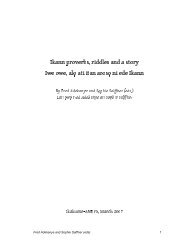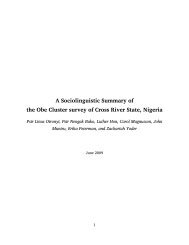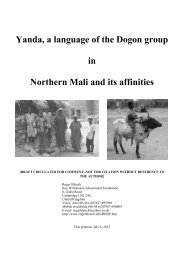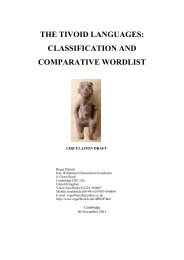A DICTIONARY OF MADA, A PLATEAU LANGUAGE ... - Roger Blench
A DICTIONARY OF MADA, A PLATEAU LANGUAGE ... - Roger Blench
A DICTIONARY OF MADA, A PLATEAU LANGUAGE ... - Roger Blench
You also want an ePaper? Increase the reach of your titles
YUMPU automatically turns print PDFs into web optimized ePapers that Google loves.
Mada dictionary: Front matter<br />
These are evidently very similar to the paradigm in Table 4 except for the 3s. In the case of polysyllabic verbstems,<br />
these very nearly mimic the monosyllabic paradigm except that the 3s is no longer irregular. For<br />
example, the verb gbojun, ‘to escape’ has the following paradigm (Table 9);<br />
Table 9. Tones on Mada polysyllabic verb-stems<br />
pron. am escaping<br />
2s wə̄ là gbǒjǔn<br />
3s gu là gbǒjǔn<br />
2p gyə̄ là gbǒjǔn<br />
1s Ngə̄ là gbojun<br />
1p tə̄ là gbojun<br />
3p bə là gbojun<br />
The uncompleted past is more distinctive however, compared with Table 6. The distinctive tone-changes in the<br />
auxiliary sə have been neutralised and the tone-oppositions marked on the verb-stem become a simple high-low<br />
opposition (Table 10);<br />
Table 10. Mada imperfective verb-stem paradigm ‘was<br />
coming’<br />
pron. was coming<br />
2s wə̄ sə nyə̀<br />
3s gu sə nyə̀<br />
2p gyə̄ sə nyə̀<br />
1s Ngə̄ sə nyə<br />
1p tə̄ sə nyə<br />
3p bə sə nyə<br />
The same changes apply to the verb ywe ‘to go’ but no other monosyllabic verbs of this type have yet been<br />
identified.<br />
3.5 Adjectives<br />
Adjectives in Mada appear to be of two major types, those which follow a noun directly and show tonal concord<br />
with it and those which follow the copula or verb to be, sē. The first type is comparatively rare and those<br />
identified so far are shown in (Table 11);<br />
Table 11. Mada concordial adjectives<br />
s. pl. Gloss Example<br />
kukwɔ kukwɔ̄ small, young mbu kukwɔ small mat mbu kukwɔ̄ small mats<br />
nggɔ̀n nggɔn nggɔn big mbu nggɔn large mat mbu nggɔn nggɔn large mats<br />
bəbə̄ — decayed, rotten krī bəbə̄ mē this rotten yam<br />
goglo — hot te mə̀sər goglo cà nggə̄ m... fetch water hot bring me<br />
kənàn — much kə̄ jī kənàn much money<br />
The first two, ‘small’ and ‘big’ show tonal concord with the noun qualified, while others do not. Some of these<br />
adjectives can also act as complements to sē;<br />
kūkwɔ̌<br />
kənàn<br />
yə̀mē sē kūkwɔ̌ this is small<br />
kə̄ kə̄ nggə̄ sē kənàn chickens my are many<br />
An unusual case is;<br />
pwà undeveloped, referring to peanuts bencwē ku pwà groundnuts fell undeveloped<br />
which might be better treated as an adverb, despite its qualifying a noun.<br />
vi


